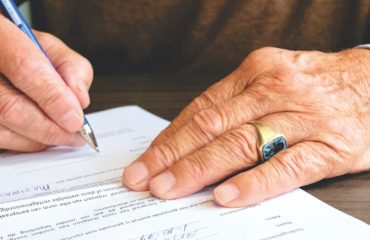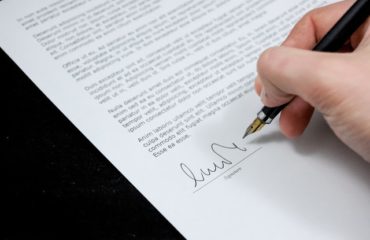
Buying property represents a major milestone in many people’s lives and can often symbolize stability and security. Property ownership often brings a sense of pride and accomplishment, provides a space you can call your own and can represent a significant investment in your future.
However, property owners must be mindful of title fraud. The recent high profile news reports of fraudsters stealing homes in Toronto and in BC have caused much anxiety to homeowners everywhere.
So what is title fraud? Title fraud can mean many things, but in general, it is a type of fraud that typically involves the fraudulent sale of a home or refinancing of a property that does not belong to the fraudster who poses as the real owner. It can result in the rightful owners losing their property or being encumbered with a mortgage that is not their own. Title fraud often goes undetected until it is too late – so let’s look at how you can safeguard your property and protect yourself from title fraud.
What Is Title Fraud?
Title fraud is a type of real estate fraud in which someone falsely claims ownership of a property and then sells or uses it as security for a mortgage loan. Title fraud can be committed in several ways, including:
- impersonating the rightful owner and selling the property without their knowledge or consent
- impersonating the rightful owner to borrow money secured against property to which the fraudster does not actually own
- creating false documents to support the fraudster’s claim to ownership for nefarious purposes
- falsifying the history of the property to make it appear that it has a clear title when it has liens or outstanding debts on title
- fabricating a chain of title to make it look like the fraudster has a legitimate claim to the property
How Can I Protect Myself from Title Fraud?
You would think that the individuals most vulnerable to title fraud are typically first-time homebuyers, the elderly, and those unfamiliar with the real estate purchasing process. While it’s true that these groups can be more susceptible to these scams, the reality is that the risk exists for all homeowners regardless of your experience or your background.
Here are some tips for protecting yourself and your loved ones against title fraud:
- Conduct a thorough and current title search to verify ownership information before purchasing a property. It’s essential to verify the authenticity of the title deed and any other related documents. This can include searching public records and checking for liens or encumbrances and obtaining a title search from the BC Land Title Office.
- Engage a qualified real estate lawyer to handle the transfer of title and perform due diligence. Legal professionals have experience to help verify the authenticity of title documents and to protect your interests during the process.
- Keep your personal information secure to prevent fraudsters from using it to commit title fraud. That includes your social insurance number, passport information and home address.
- Regularly monitor your credit report to detect any unauthorized activity, such as the opening of a new bank account or line of credit in your name which may suggest that your financial information has been compromised.
- Purchasing title insurance from a legal professional to compensate you in case you suffer a loss due to title fraud. It’s not too late to buy a policy even if you’ve owned the property for a few years now.
- You can also apply to the land title office to physically remove the title itself, known as the ‘duplicate title’ but then you’re responsible for storing the duplicate title in a safe place, and you’ll need to re-deposit the duplicate title when you want to sell or deal with the property. If the duplicate title is removed, transactions involving the home cannot take place, however if you lose the duplicate title, you’ll have to go through a very burdensome process to replace it.
- Sign up for ‘alerts’ on Google or other search engines which will alert you if there are news about your home address. Many properties listed for sale will be published on a realty webpage, and an alert can give you advanced warning if someone tries to list your property, but this method is not fool-proof and is definitely not a replacement for title insurance which protects a lot more than just a home being fraudulently sold. For example, if a fraudster took out a mortgage and borrowed money against your home, that would likely not trigger a google alert and you may still suffer a loss.
What is the impact to innocent home buyers who purchase a home from a fraudster?
- For now, the legal impact on buyers is, surprisingly, muted. That’s because for innocent buyers who paid fair market value for their homes, their rights as homeowners will in most cases be preserved once they register on title under the current land title system known as the Torrens System. This provides certainty of ownership to buyers, as long as they were not part of the fraud, and as long as they paid a fair price their home, that they have the assurance that the home usually cannot be taken away from them just because a fraudster pretending to be the seller sold it to them. In other words, this means that registration of the buyer’s ownership provides certainty and is conclusive of their ownership rights, a concept known in law as ‘indefeasible title’ . However, this also means it’s more difficult for the original owners who are victims of fraud, to get their title back once it is registered to an innocent home purchaser.
- If the buyers paid fair and good money for the house, in most cases, they would be the ones to suffer the loss if they simply gave the house back to the seller, unless they were compensated. However, in most cases, the seller is not going to want to pay additional monies to re-purchase their own house from the innocent buyer. In theory, the Land Title Office in BC has an insurance fund known as the ‘Assurance Fund’ >which should reimburse the owners in case of property fraud. However, in practice, this route is often time consuming, cumbersome, and the owners face significant hurdles to go through the process to get fully compensated from the Assurance Fund. Buyers are encouraged to purchase private insurance known as ‘title insurance’ which will often compensate the buyers if they suffer any loss as a result of title fraud. Title insurance can be purchased through a lawyer or notary public, and provides more protection in the form of financial compensation to title insurance policy-holders affected by the fraud which could include not just individuals but also the banks who lend mortgages registered against a fraudulent title.
Can owners who are defrauded get their house back?
- going back to the concept of ‘indefeasible title’, it may be difficult for the original owners to ‘get their properties back’ as long as the buyers were not part of the fraud, and paid fair market value for the properties. Sellers could in theory re-purchase the property back from the innocent buyers with the financial compensation from title insurance, but there is no guarantee that the buyers would be willing to re-sell the house back to the seller. Of course, each case has to be looked at on a case-by-case basis, and if the buyers did in fact collude or co-operate knowingly with a fraudster to purchase the property, then the defrauded homeowner could take the matter to the BC Supreme Court, but that could still involve lawyers and potentially a trial, hence the necessity of title insurance to potentially pay for the legal expense of doing so.
Real Estate Lawyers in Richmond, British Columbia
If you suspect that you are a victim of title fraud, report to the police immediately and consult a real estate lawyer. Reinstating ownership of a property title can be time-consuming and often times, you must act quickly. At Bernard Lau & Co., we have experience to advise you on protecting yourself from title fraud. If you’d like to learn more about title fraud or would like to order title insurance, call us at 604.285.5242 or complete our contact form to arrange a consultation.
The content on this website is provided for general information purposes only and does not constitute legal or other professional advice or an opinion of any kind. Users of this website are advised to seek specific legal advice by contacting members of Bernard Lau and Co. (or their own legal counsel) regarding any specific legal issues. Bernard Lau and Co. does not warrant or guarantee the quality, accuracy or completeness of any information on this website and should not be relied upon as being proper, accurate, timely or fit for any particular individual’s own circumstances other than for educational purposes.
Accessing or using this website does not create a lawyer-client relationship. Although your use of the website may facilitate access to or communications with members of Bernard Lau and Co. via e-mail transmissions or otherwise via the website, receipt of any such communications or transmissions by any member of Bernard Lau and Co. does not create a lawyer-client relationship. Bernard Lau and Co. does not guarantee the security or confidentiality of any communications made by e-mail or otherwise through this website.



